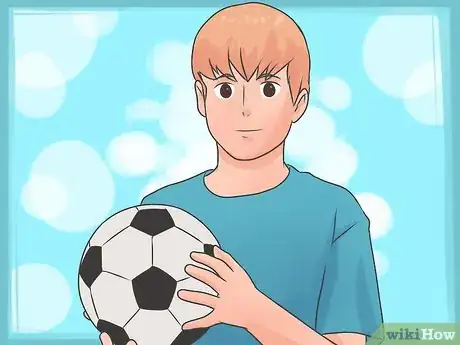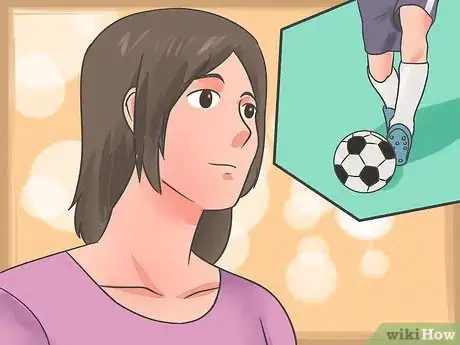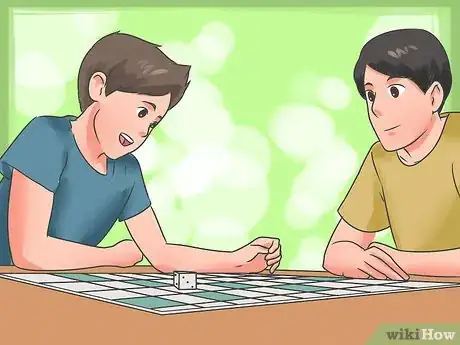X
wikiHow is a “wiki,” similar to Wikipedia, which means that many of our articles are co-written by multiple authors. To create this article, volunteer authors worked to edit and improve it over time.
There are 8 references cited in this article, which can be found at the bottom of the page.
This article has been viewed 54,357 times.
Learn more...
Playing sports is a rite of passage for most kids. But competition and kids can become a touchy subject—some kids and parents can get too competitive and turn into poor sports when they lose, while other kids just can’t seem to get the competitive bug. Here’s how to teach your child to be more competitive in sports without turning them into a monster.
Steps
Part 1
Part 1 of 3:
Acknowledging Your Child's Strengths and Personal Preferences
-
1Find your child's motivation. Every child has a different motivation for sports and competition. Some just want to win, while others are more focused on having fun, learning new skills, or just being with their friends.[1]
- After games and practices, ask your child questions like “Was it fun?”, “Did you win?”, or “Did you learn anything?” to see what their motivations are. In general, the question that the child answers most excitedly is where their true motivation lies.
- just For example, if a child is really excited to tell you how fun the activity was, but isn’t as quick to respond to a question about what he learned, his motivation is most likely to have fun.
-
2Choose a suitable sport for your child. Once you understand your child’s motivation, you can tailor their activities and your approach to their desires.[2]
- For example, if a child’s motivation is to have fun, put them in a sport with their friends or with a coach who uses creative drills and exercises. If their main need (to have fun) is met, they can then focus on being competitive.
- For a child whose motivation is to learn something new, talk to the coach about teaching that child special skills or work with her one-on-one so she masters a new skill and can use it to become more competitive.
Advertisement -
3Help your child to gain confidence in their abilities. A major emotion in competition is confidence—many children aren’t competitive because they aren’t confident in their sports abilities.[3]
- Talk to your child openly about their fears and dreams, and work together to set goals of what skills to work on. Stay positive around your child, and praise and encourage him during good and bad times.
- Even if your child isn’t particularly athletic, they can still gain confidence as you praise their hard work and dedication. Once a child feels confident and comfortable in their abilities, they naturally become more competitive.
-
4Change to a different activity if your child is unhappy. Some children simply aren’t naturally competitive about sports. If this is the case for your child and you’ve tried (unsuccessfully) to instill a competitive attitude, try moving your child to a different sport or waiting a few years to see if their competition level changes. Many children naturally get more competitive as they get older.
- If your child is unhappy and not competitive, consider moving them to another activity that would interest them more, such as music or dance classes.
- Although having a competitive child can be good for their future endeavors, having a child who is happy and enjoys their activities is even more important.
Advertisement
Part 2
Part 2 of 3:
Signing Up for the Right Sports
-
1Talk to your child about their athletic interests. A child who is put in baseball when he really wants to play basketball is going to have a hard time getting competitive in a sport that doesn’t interest him. Be flexible with your child’s needs and sign them up for sports that match their interests and abilities.
-
2Never put your child in a situation where they don’t at least have a fighting chance of winning. If your child is on a team or league where everyone is above his level, he won’t have fun and can easily get discouraged.[4]
- Children on teams that never win will lose their competitive drive because they don’t see it paying off. When your child is first starting in a sport, put them in a recreational league with children around the same age and skill level.
- If you really want your child to win, put him in a league where he is one of the older athletes.
-
3Look for teams that will push your child - within reason. As he advances, look for sports and teams that will push your child to progress but not leave him alone, lost, and discouraged. Select and club teams are generally more competitive, but can be a major mental and time commitment.
- Talk to other parents before signing up for a sport to see what their experience has been with the team and league. Talk to the coach about his coaching strategy and see if it will be a good fit for your child. If the coach only talks about winning, he may be too competitive.
- Look for a coach that wants to win and will run a good team, but who also understands that kids are still growing and learning. Remember your child’s motivations and find a team that will match those and continue to push him.
-
4Encourage your child to set personal goals. Teaching your child that winning or losing isn’t important can help to prevent them from feeling worthless when they lose. Encourage your child to focus on competition with himself, instead of competing against other players.[5]
- This not only teaches important life lessons, but also helps a child avoid becoming too competitive. Talk with your child about setting personal goals for their performance, and check in regularly with their coach and your child to check their progress.
- Inner competition can be a powerful driving force that can help your child development self-confidence and motivation that can translate to activities off the field.
-
5Analyze each game your child plays. After each game, spend some time analyzing the child's performance (in a positive, constructive way).
- Ask them what they think they did well, what they can work on in the future, and what would have happened if they had tried harder.
- Use the personal goals they have set for themselves as an opportunity to teach problem solving and help older children understand what they can do to keep improving.
Advertisement
Part 3
Part 3 of 3:
Encouraging Competition at Home
-
1Create a healthy atmosphere in your home by playing family games. Even simple card or board games, such as Old Maid or Monopoly, can create a positive atmosphere for competition, where people play the game with strategy and the intent to do their best, but not to the point of sabotaging other players or getting angry when someone else wins.[6]
-
2Set a good example for your child. Play the board game to win, but don’t be a sore loser who acts out when something doesn’t go their way by throwing a tantrum and ruining the experience for the other players.
- Children will model what they see their parents do, so use this opportunity to establish proper, healthy competition. Teach them that winning the game isn’t the most important part, but that you learned something and had a fun time together.
-
3Deal with any tantrums. If your child throws a tantrum when they lose the game, take them aside and let them calm down, then talk to them about better ways to express their feelings. Help them realize how much fun they had playing the game by pointing out the things that went well.[7]
- Toddlers and young school-age children are especially prone to being sore losers because they are just learning what it means to win and lose.
- Help them to understand that it doesn't mean they aren’t good at something just because they didn’t win the game
-
4Foster some healthy sibling rivalry. In homes with multiple children, sibling rivalry is a natural occurrence. Children with siblings are naturally more competitive in life and in sports because they have always had someone to compete against.
- Teach your children from an early age what healthy competition looks like by encouraging each child to do their best. Prompt them to congratulate their siblings on their victories and successes.
- Children without siblings are at a natural disadvantage when it comes to being competitive, so look for other children, such as friends, neighbors, or cousins, to build and demonstrate a healthy competition with.
Advertisement
Community Q&A
-
QuestionIs it possible to become too competitive in sports? In what way?
 Frida BerglindCommunity AnswerYes. If you only think about winning and beating the other party, then you're too competitive. Sports is about having fun. But being competitive isn't a bad thing as long as it doesn't hurt you or anyone around you.
Frida BerglindCommunity AnswerYes. If you only think about winning and beating the other party, then you're too competitive. Sports is about having fun. But being competitive isn't a bad thing as long as it doesn't hurt you or anyone around you.
Advertisement
References
- ↑ https://kidshealth.org/en/parents/active-kids.html
- ↑ https://www.webmd.com/parenting/raising-fit-kids/move/features/childs-inner-athlete
- ↑ https://www.understood.org/en/friends-feelings/child-social-situations/sports/6-ways-to-improve-your-childs-self-esteem-with-extracurricular-activities
- ↑ https://www.psychologytoday.com/us/blog/peaceful-parents-happy-kids/201506/12-ways-raise-competent-confident-child-grit
- ↑ https://www.psychologytoday.com/us/blog/peaceful-parents-happy-kids/201506/12-ways-raise-competent-confident-child-grit
- ↑ https://raisingchildren.net.au/preschoolers/behaviour/behaviour-management-tips-tools/teaching-skills
- ↑ https://kidshealth.org/en/parents/temper.html
- http://kidshealth.org/parent/positive/family/sports_competition.html
- http://www.cnn.com/2013/03/20/living/po-bronson-ashley-merryman-top-dog-qa/
About This Article
Advertisement















-Step-8.webp)















-Step-8.webp)




































